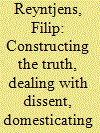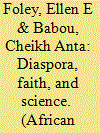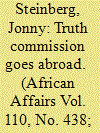| Srl | Item |
| 1 |
ID:
101913


|
|
|
|
|
| Publication |
2011.
|
| Summary/Abstract |
Post-genocide Rwanda has become a 'donor darling', despite being a dictatorship with a dismal human rights record and a source of regional instability. In order to understand international tolerance, this article studies the regime's practices. It analyses the ways in which it dealt with external and internal critical voices, the instruments and strategies it devised to silence them, and its information management. It looks into the way the international community fell prey to the RPF's spin by allowing itself to be manipulated, focusing on Rwanda's decent technocratic governance while ignoring its deeply flawed political governance. This tolerance has allowed the development of a considerable degree of structural violence, thus exposing Rwanda to the risk of renewed violence.
|
|
|
|
|
|
|
|
|
|
|
|
|
|
|
|
| 2 |
ID:
101919


|
|
|
|
|
| Publication |
2011.
|
| Summary/Abstract |
This article examines a development initiative spearheaded by the members of a transnational diaspora - the creation of a medical hospital in the holy city of Touba in central Senegal. Although the construction of the hospital is decidedly a philanthropic project, Hôpital Matlaboul Fawzaini is better understood as part of the larger place-making project of the Muridiyya and the pursuit of symbolic capital by a particular Mouride dahira. The dahira's project illuminates important processes of forging global connections and transnational localities, and underscores the importance of understanding the complex motivations behind diaspora development. The hospital's history reveals the delicate negotiations between state actors and diaspora organizations, and the complexities of public-private partnerships for development. In a reversal of state withdrawal in the neo-liberal era, a diaspora association was able to wrest new financial commitments from the state by completing a large infrastructure project. Despite this success, we argue that these kinds of projects, which are by nature uneven and sporadic, reflect particular historical conjunctures and do not offer a panacea for the failure of state-led development.
|
|
|
|
|
|
|
|
|
|
|
|
|
|
|
|
| 3 |
ID:
101916


|
|
|
|
|
| Publication |
2011.
|
| Summary/Abstract |
Under former President Mbeki, South Africa provoked international dismay and criticism when it tried to block United Nations censure of Burma, Sudan, and Zimbabwe for gross human rights abuses. In the case of Sudan, Pretoria stood accused of turning a blind eye to Khartoum's excessive and indiscriminate violence in Darfur, betraying South Africa's own struggle for democracy and commitment to promoting human rights. This article seeks to shed light on Pretoria's foreign policy by explaining its position on Darfur and exploring the relationship between ideas and interests in shaping the policy. I argue that the position on Darfur was not unfathomable or realist, as some observers claimed, but was based on the core ideas of South Africa's foreign policy: the African Renaissance; quiet diplomacy as the most effective means of dealing with pariah regimes; solidarity with African governments under pressure from the West; and an anti-imperialist paradigm that provided the lens through which the government viewed the global order, defined the country's interests, and conceptualized human rights. Whereas most studies of Pretoria's foreign conduct pay little heed to the policies of the ruling party, I show that the conduct flowed logically from the party's anti-imperialist ideology.
|
|
|
|
|
|
|
|
|
|
|
|
|
|
|
|
| 4 |
ID:
101921


|
|
|
| 5 |
ID:
101914


|
|
|